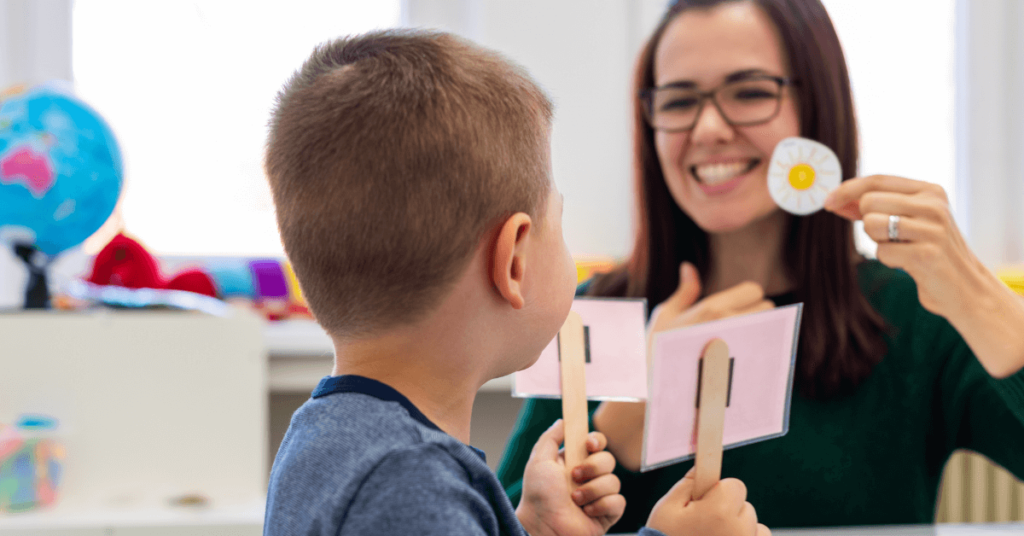Many children with autism and ADHD need help with communication and language. This can include improving spoken language skills, understanding body language and facial expressions, communicating through devices, learning communication social skills and more. Whether your child receives speech therapy in or outside of school, you can help support your child’s speech therapy at home. Find out six ways you can support speech therapy at home.
Why is speech therapy important?
The Merriam-Webster Dictionary defines speech therapy as the “therapeutic treatment of impairments and disorders of speech, voice, language, communication, and swallowing.”
One common trait of autism is difficulty with communication. That can include speech delays, literal use of language, difficulty understanding non-verbal communication, inability to speak, and communication social skills deficiencies. Good communication skills are a cornerstone of being successful in life, so it’s important that our children with autism obtain the assistance they need to learn how to communicate well. Improving communications skills also increases the ability to read and write well, which leads to better school performance.
Our son J had speech therapy all through elementary school. He had a fabulous speech therapist who worked really well with him, and she taught me a great deal as well to help him at home. She focused mostly on helping him to understand body language and facial expressions, learn conversation starters, comprehend how not all language is literal and worked with him on various communication social skills. His speech therapist really helped him to improve his communications skills during those five years.

How does speech therapy help children with autism?
Speech therapy helps children with autism in several ways. A speech therapist may work with your child to:
- Improve overall language and communication skills.
- Develop and implement treatment plans for verbal skills by helping the child to improve spoken language, strengthen muscles, and speak more clearly.
- Work on non-verbal skills by helping them understand body language and facial expressions as well as learning how to use augmentative and alternative communication (AAC) devices and tools.
- Learn social skills such as start and keep conversations going, improve social communications, respond to questions, and understand social rules related to communication.
Supporting your child’s speech therapy at home
So how can you as a parent support your child’s speech therapy at home? Talk to your child’s speech therapist for any specific exercises or tasks they would like you to work on with your child. In addition, try these six suggestions at home.

1. Read
Both reading to your child and having them read to you can help your child improve their speech. You can read a short book to your child, and then have them read it back to you. They can hear how the words are pronounced, and then they can practice while reading out loud themselves.
2. Listen to your child
Talk to your child and ask questions. Then really listen to your child’s answers. Be patient and don’t try to rush them as they try to find the words to respond. If they have difficulty with saying certain words or trying to find the right words to use, help them but only after letting them try to figure it out for themselves.
3. Use straws
Give your child straws to use both for drinking and sucking or blowing out air. This will help strengthen their muscles for speech. One idea is to have the use a ping pong ball and straw to suck in air and pull the ball toward them, and then to blow out air to push it away.
4. Role play
One of the best ways to support social skills training at home is to role play. You can role play conversation starters, facial expressions and social situations scenarios. We used to do this our son J when he was in speech therapy, and it was a great way to support it at home.
Need some ideas for role playing? Check out these role play game suggestions for children with autism to help support speech therapy at home.

5. Work on speech sounds
Ask your child’s speech therapist how you can help your child practice speech sounds at home. They may have some specific sounds they would like for your child to work on at home. For some general ideas about how to work on speech sounds, try some of these fun activities.
6. Keep it short
Don’t feel like you need to spend all your evenings and weekends working on speech with your child. In fact, research shows that a fewer short bursts of speech therapy practice is more effective. Therefore, two 5-minute sessions per day is enough to work support speech therapy at home. Need some more ideas? Check out these home speech activities to use with your child.
What exercises or practice have you tried at home to support your child’s speech therapy? Share in the comments below so that we can encourage each other on this journey!








